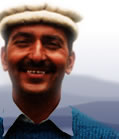 |
 |
||
 |
|||
|
RELATED THEMES culture and customs environment politics OTHER LOCAL THEMES BACKGROUND |
identity All the testimonies are from one geographically distinct community and there appears to be a somewhat collective consciousness in terms of how narrators present life in Shimshal. The image presented is that of a community of individuals who are all conscious of their responsibilities towards others in the community and to the development of Shimshal in general. Narrators also seem proud of Shimshal's history, culture and environment. Very few are critical of their society and there are few contradictions or conflicts between testimonies. This apparently conscious presentation of Shimshal by Shimshalis should be seen in the context of Shimshalis' experiences of misrepresentation by outsiders. In particular, the explorer and British officer Schomberg, who travelled through Northern Pakistan in the 1930s, wrote about the Shimshalis as "uncivilised" and "ignorant". More recently some Shimshalis were offended by the promotional literature of a tourism company which presented Shimshal as a kind of living museum. In 2002 a major non-governmental organisation produced a publication which presented Shimshalis as a "rare breed of mountain people leading a simple high-pasture life". Not surprisingly then, the politics of representation is a key issue for many Shimshalis. An overriding aim of the Shimshal Nature Trust (SNT) is for Shimshalis themselves to communicate with the external world, and to present in their own words their ideas for development and sustainable management of their environment. The environment, in particular the beauty of and people's fondness for Pamir, and the difficulties of the journey to and from Shimshal in the past, are discussed by a significant number of narrators. It would seem that people's relationship with their environment is a key part of their identity. In fact one narrator (Pakistan 2) states: "If I talk about myself I feel I am talking about Shimshal if I talk about Shimshal I feel I am talking about myself" A number of male and female narrators have lived outside of Shimshal for various periods of time either for education or employment and they compare life in the large urban centres of Pakistan with life in Shimshal. The experience of living outside Shimshal certainly makes people appreciate the sense of community and the environment that define life in Shimshal. Many narrators talk about how shared cultural traditions, festivals and a shared history all contribute to one's identity as a Shimshali. Many customs and practices are distinctly Shimshali, such as the Shimshali calendar which is based on the position of the sun on the mountains which surround the village - this is described in detail by Chughbai (Pakistan 13), the expert on this calendar. Nomus (system of donating resources for a community project in the name of a relative) also appears to be particular to Shimshal: "[Nomus] provides pride for the family and happiness for the community. This exists nowhere else than in Shimshal. It solves a problem for the community… It is a historical record that this particular person has done this and that, and they have donated such assets for the community" (Pakistan 22). Identity is also related to the wider cultural language group to which Shimshalis belong (Wakhi) and to religion (Ismailism). The importance of being Ismaili is well illustrated in an interview with a mountaineer: "When we reached the top [of Nanga Parbat], the weather was very clear… As you know our Imam's (the Aga Khan's) leadership and guidance is always with us… When I climbed Broad Peak, G-2 and Nanga Parbat, I first of all placed our Imam's flag, and then our country's flag" (Pakistan 24) Muzaffer and Inayat (Pakistan 29 and Pakistan 2) both explain that when they first left Shimshal to study in Gilgit they were ashamed of where they came from because it was so remote. Muzaffer (Pakistan 29) explains: "we faced a kind of problem: children would discriminate against us because of us being Shimshali, being remote, with no road… having a slight difference of accent etc. So these were some things… I always felt, you know even some teachers ridiculed that too." As they grew up and visited various cities in Pakistan their ideas around where they came from changed and they began to appreciate the beauty of their area. The interaction with a group of young Japanese people also helped to generate feelings of pride for Shimshal. Community discussions about Shimshal's identity and the Environmental Education Programme were both ideas from this interaction. Inayat (Pakistan 2) explains their impact: "…everyone says that today Shimshal has a special image in the Northern Areas... That's not isolation, that's not discrimination… today the identity of Shimshal…has changed. So this is because we have been successful in making people feel, making them realise that what they have got… [and] to be proud of it." Muzaffer, one of the coordinators of the project (Pakistan 29), explained that prior to the construction of the Karakoram Highway (KKH) Shimshal's identity was of a relatively prosperous place with access to the precious commodity of salt, and with plenty of pasture and livestock, and many good hunters. The construction of the KKH changed this situation as those communities lying along the KKH (most villages in Hunza and Gojal) gained greater economic opportunities, whereas Shimshal became relatively poor and Shimshalis were referred to as "donkeys" because of the fact that they had to carry everything into Shimshal. Since the early 1990s Shimshal's identity and image has improved for a number of reasons: the Japanese exchange programme resulted in the Environmental Education Programme which has become well known throughout the region; Rajab (Pakistan 23) became the first Pakistani climber to climb all five peaks over 8,000 metres in Pakistan; several Shimshali students have excelled at their education; a number of international academics chose Shimshal as the site of their research; and the establishment of the SNT. quotes about identity"…going out of Shimshal, that was the best thing that taught me to respect myself. Because I started really comparing, that what is the beauty of my own life, compared to Karachi, a city life... And that was something you know I really felt that well, because in Karachi we used to talk about Shimshal a lot. And most of the boys just love talking about Pamir, and that independence, and everything… Those are the things that really changed our perception of our own self, our own society. We started realising that actually we've got something, you know, that others don't: beautiful nature, the Himalaya, the mountains, glaciers, that independence - that most important thing that you can go about without fear. And so that was the thing which has really obsessed me about my village." "Things are changing more rapidly than they were in our parents' lives. Fifteen years ago, I was a shepherd in the village; today I am an executive officer… Isolation too has a gift of its own: we had a [specific] identity… [it was a] bit mysterious. Yaks, strong people, no road, and things like that. Very few people had access [to us]… But once this road gets here the…most serious challenge for the community will be redefining our identity… I feel the next five or six years will be hard for the community - a sort of crisis of identity… Globalisation can have a strong impact on people's lives, even in Shimshal. We would no longer be able to maintain the sense of being the sole custodians of this environment. The changes can even turn your strengths… such as your simplicity, your honesty... into weaknesses." "When I was in Karachi I never even told people I was from Shimshal… because I felt being a Shimshali means remoteness, isolation, discrimination. The first kind of revelation came to me in Japan. That was maybe the first time I looked deep and tried to understand life and human society. I tried to understand the ugly side of the glittering (modern) world. There I realised what it meant to be Shimshali; I felt it is a blessing, not a shame. I felt there are opportunities being where I am from and what I am." "I will say that if any stranger speaks my native language (Wakhi) I feel he is my brother. When I go to a strange place (other cities and areas) and feel difficulty in understanding a language, if I find a stranger speaking my language I feel he is my brother. I become very happy to share my feelings with him and tell him my problems." "The main objective behind my poetry is to work for the survival of our Wakhi language, because many Wakhi words have been lost, or replaced by [words from] other languages. I am trying to get the lost words back. For example, muthi, (a local medicine used to treat cuts or burns), had been replaced by an Urdu word, marham. So I am trying to use these sorts of words in my poetry. Nowadays, I am busy working on the alphabet of our Wakhi language. I want everyone to be able to read our language." "My perception of the future of Shimshal is very encouraging… when we will fully integrate into the national life (establish communication links) and developments will take place, then we will again be prosperous… We own a vast geographical area (2700 square kilometre), full of scenic beauty… we have tremendous potential for tourism… I personally feel proud and rich when I think about the future of Shimshal, as we possess everything [required for development]… I think that in future people will again feel proud to be called Shimshali." "It was a common proverb about Shimshal that it is a place of "butter and meat", the place of wealth… And many of the elite in Gojal got their daughters married in Shimshal - it was for the reason that they deemed Shimshal safe and comfortable for their daughters." |
|